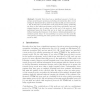Free Online Productivity Tools
i2Speak
i2Symbol
i2OCR
iTex2Img
iWeb2Print
iWeb2Shot
i2Type
iPdf2Split
iPdf2Merge
i2Bopomofo
i2Arabic
i2Style
i2Image
i2PDF
iLatex2Rtf
Sci2ools
115
click to vote
ACNS
2007
Springer
2007
Springer
Privacy-Preserving Set Union
Recently there has been a significant amount of work on privacy-preserving set operations, including: set intersection [14, 6, 21, 9], testing set disjointness [17], multi-set operations [18], and set union [16, 1, 18]. In this paper, we introduce novel protocols for privacy-preserving set union in the malicious adversary model. More specifically, each participant inputs a set of values, and at the end of the protocol, each participant learns the items that are in at least one participant’s set without learning the frequency of the items or which participant(s) contributed specific items. To our knowledge our protocol is the most efficient privacy-preserving set union protocol for the malicious adversary model to date.
Related Content
| Added | 18 Oct 2010 |
| Updated | 18 Oct 2010 |
| Type | Conference |
| Year | 2007 |
| Where | ACNS |
| Authors | Keith B. Frikken |
Comments (0)

